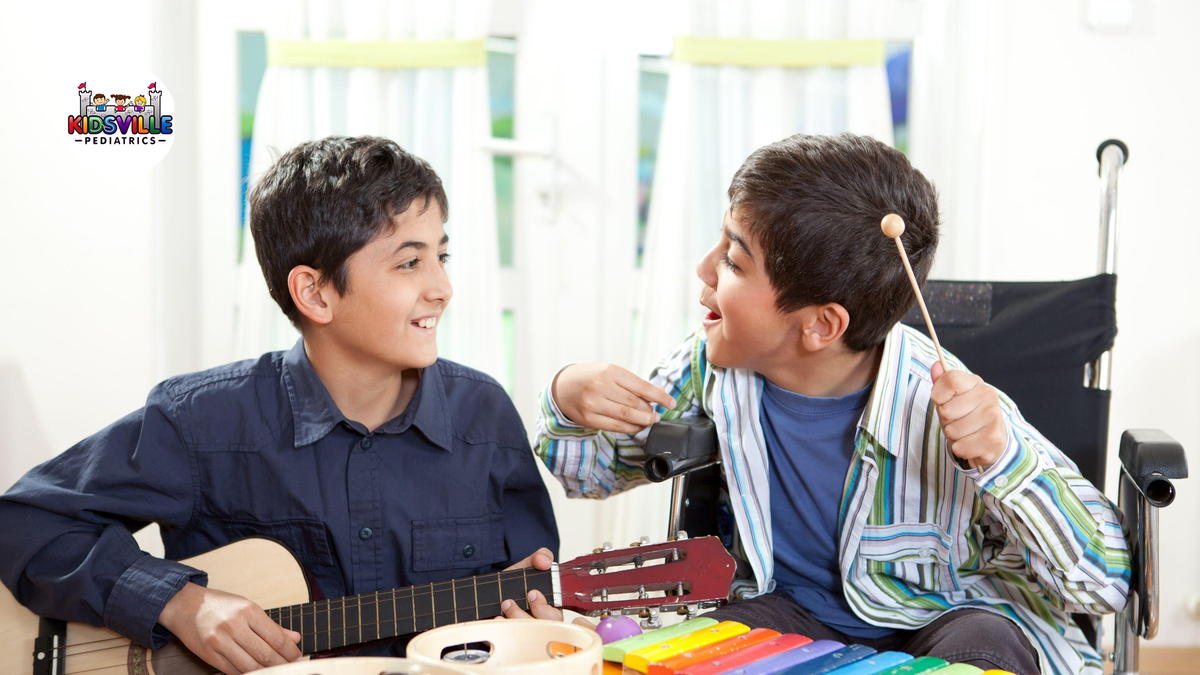Exploring the Therapeutic Benefits of Playing Musical Instruments in Everyday Life

Understanding the Impact of Music on Mental and Emotional Health
Every day, countless individuals immerse themselves in the world of music, tapping into its intrinsic ability to evoke emotion and inspire creativity. The act of playing a musical instrument not only fosters this creativity but also serves as a powerful tool for enhancing mental and emotional well-being. The therapeutic benefits of music are supported by an increasing body of research, highlighting its role in improving quality of life.
Research indicates that engaging with music has profound therapeutic effects, such as:
- Reducing stress and anxiety: Strumming a guitar or playing the piano can lower cortisol levels, a hormone associated with stress. Studies show that even listening to soothing music can produce a relaxation response, allowing individuals to unwind after a long day.
- Improving cognitive function: Learning an instrument significantly boosts memory and coordination. A longitudinal study found that children who engaged in musical training showed marked improvements in spatial-temporal skills, an indicator of cognitive development. This suggests that musical training can lay the groundwork for better academic performance, particularly in subjects such as math.
- Enhancing social connections: Playing in a group, whether it is in a band or an orchestra, fosters camaraderie and reduces feelings of isolation. Music brings people together, facilitating friendships and community connections that can lead to improved mental health outcomes.
As you dive into the nuances of musical engagement, consider the various instruments that can transform your daily life:
- Piano: Offers a structured way to learn music theory while providing an emotional outlet. The versatility of the piano allows for a wide range of musical styles, making it an excellent choice for personal expression.
- Guitar: Portable and versatile, it is a fantastic option for social gatherings. Whether at a campfire or a backyard barbecue, the guitar invites interaction and shared experiences.
- Drums: These offer a unique avenue for stress relief and physical engagement, allowing players to release pent-up energy and express themselves through rhythm.
Exploring these therapeutic benefits in today’s fast-paced society can lead to a healthier, more fulfilled lifestyle. Music offers a unique avenue for self-discovery and emotional healing, emphasizing that the journey into music is not only about the notes played but also about the profound connections and healing power that resonate within.
Ultimately, engaging with music—whether through learning an instrument or simply listening—opens doors to personal growth, mental clarity, and emotional resilience. As more individuals recognize and harness these benefits, it cultivates a community that prioritizes holistic well-being through the transformative art of music.
DISCOVER MORE: Click here to dive deeper into artistic expression
The Transformative Power of Musical Instruments
As we delve into the myriad ways that musical instruments can enhance everyday life, it’s important to recognize the psychological and emotional transformations that often occur through these experiences. Whether a child picks up a violin for the first time or an adult re-engages with an old passion for the drums, playing an instrument can be a pathway to mental clarity, emotional stability, and overall well-being.
One significant aspect of engaging with musical instruments is its role in emotional expression. Playing an instrument allows individuals to channel their feelings into sound, creating a bridge between inner experiences and outward expression. For instance, musicians often describe the act of playing as a form of therapy, where they can explore complex emotions without the use of words. This emotional release can be particularly beneficial for those who may find it challenging to articulate their feelings through traditional communication outlets.
Furthermore, the physical act of playing an instrument has been shown to release endorphins, the body’s natural feel-good chemicals. In a study conducted by the Association for the Advancement of Arts Education, participants who engaged in musical activities reported significant increases in happiness levels after a short session of music practice. The simple act of creating music fosters a sense of accomplishment and fulfillment, leading to enhanced self-esteem and positive feelings.
A deeper understanding of the cognitive benefits of playing musical instruments comes from neurology research. The brain, when exposed to music, shows increased levels of neural connectivity. Learning how to read music, coordinate movements, and manage rhythm and timing exercises various areas of the brain, leading to improved focus and memory retention. This phenomenon is particularly evident in studies of children. For example, children who learn to play the piano often display increased capabilities in problem-solving and critical thinking—skills that are vital not just in academics, but in life overall.
Moreover, playing instruments contributes to social engagement. Music inherently has a communal aspect, and participating in music groups or ensembles can be a major source of social interaction and support. Here are some avenues through which music fosters connections:
- Group Lessons: Taking lessons in a class setting helps individuals bond over shared interests while also making the learning process more enjoyable.
- Community Bands: Joining local bands or orchestras not only enhances musical skills but also opens up opportunities to meet new friends and engage within the community.
- Online Collaborations: In the digital age, many musicians connect through online platforms, creating a sense of global community centered around shared melodies and rhythms.
Ultimately, as we explore the therapeutic benefits of engaging with musical instruments, it becomes evident that these experiences extend far beyond the music itself. They encompass the emotional, cognitive, and social realms, all contributing to a richer, more fulfilling life.
Understanding the Therapeutic Value of Music
Music is not just entertainment; it is also a powerful tool for emotional healing and well-being. Numerous studies underscore the therapeutic benefits of playing musical instruments. Engaging with music can foster a range of positive effects, from stress reduction to improved mental health. For individuals struggling with anxiety or depression, the act of playing an instrument offers an escape and a means for expression that can be incredibly liberating.
Musical engagement enhances cognitive skills and emotional regulation. When individuals learn to play an instrument, they stimulate various parts of the brain, leading to better memory and concentration. This cognitive improvement is particularly crucial for children and adolescents as they navigate complex emotional landscapes during their formative years.
Furthermore, the physical act of playing an instrument can improve fine motor skills and coordination. Whether it’s strumming a guitar or tapping piano keys, musicians develop hand-eye coordination that benefits them in other areas of life. These skills can also boost self-esteem as individuals witness their progress and mastery over their instrument.
The social aspect of making music should not be overlooked either. Group settings, like bands or orchestras, provide community and connection, essential for mental well-being. Together, these elements substantiate the importance of integrating musical activities into our daily lives, inviting everyone to explore the enriching world of music.
| Advantages | Description |
|---|---|
| Emotional Healing | Playing an instrument provides a powerful outlet for expressing feelings and reducing stress. |
| Cognitive Enhancements | Musical training boosts memory, concentration, and overall cognitive development. |
| Physical Skill Improvement | Enhances fine motor skills and hand-eye coordination through practice. |
| Social Benefits | Creating music in groups fosters community and social connections. |
Indeed, the act of playing musical instruments is enriching not only in terms of personal development but also in cultivating important social relationships, underscoring the multifaceted benefits of music that extend far beyond mere enjoyment.
DISCOVER MORE: Click here to dive into the world of landscape photography
The Connection Between Music and Mindfulness
In an age where stress and distractions dominate our daily lives, engaging with musical instruments can also serve as a powerful form of mindfulness practice. When individuals immerse themselves in the act of playing, they often find themselves in a state of flow—fully present in the moment, with their minds focused entirely on the sounds they’re producing. This heightened state of awareness allows musicians to tune into their emotions, reducing anxiety and promoting mental clarity.
Research from the Journal of Music Therapy highlights that individuals who regularly engage in music-making report lower levels of stress and improved coping mechanisms. The rhythmic patterns and melodies in music offer an anchor for individuals, providing a sensation reminiscent of meditative practices. This synergy between music and mindfulness not only offers an avenue for relaxation but also encourages personal reflection and growth.
The Role of Musical Instruments in Physical Health
Interestingly, the therapeutic benefits of playing musical instruments extend beyond emotional and mental health. For instance, learning an instrument often requires physical coordination, which can enhance motor skills and improve overall dexterity. Instruments like the guitar or piano demand the use of both hands in harmony, engaging fine motor skills that are crucial in maintaining agility, particularly in adolescence and older age.
Moreover, playing wind instruments, like the trumpet or flute, necessitates breath control and lung capacity enhancement. According to a study published in the American Journal of Respiratory and Critical Care Medicine, playing wind instruments can aid individuals with respiratory conditions by encouraging deeper and more controlled breathing. This not only helps musicians perform better but can also lead to improved lung health over time.
Music as a Gateway to Personal Resilience
Beyond the physical and emotional benefits, engaging with musical instruments fosters a sense of personal resilience. The journey of mastering an instrument is often rife with challenges—frustration over difficult passages, the discipline required for practice, and the realization that progress takes time. Overcoming these hurdles fosters perseverance and grit, two qualities vital not only in music but in everyday life.
The process of learning and evolving as a musician demands patience and commitment. Various studies suggest that individuals who pursue musical education exhibit higher resilience levels, which can translate to better handling of challenges and stressors in other areas of their lives. For example, children engaged in music education demonstrate significant improvements in their ability to handle setbacks in academic environments, enhancing both their social-emotional skills and self-regulation.
Integrating Music into Daily Routines
To fully harness the therapeutic benefits of playing musical instruments, it’s essential to explore how to integrate music into everyday routines effectively. Simple practices can make a noticeable difference, such as:
- Daily Practice Sessions: Setting aside just 20-30 minutes each day for music practice can serve as a dedicated time for self-reflection and stress relief.
- Musical Journaling: Keeping a journal to document musical progress or emotions expressed through music can deepen self-awareness and track development.
- Making Music a Family Affair: Engaging in musical activities with family members can foster closer connections while providing support in a shared creative outlet.
By embracing music as a therapeutic tool in daily life, individuals can embark on a journey that enriches their emotional landscape, enhances physical health, bolsters personal resilience, and brings joy through the art of sound. The impact of playing musical instruments reaches far beyond the notes played, highlighting the profound connection between music and holistic well-being.
DON’T MISS: Click here to discover delicious recipes
Conclusion: The Harmonious Impact of Music in Everyday Life
In summary, the exploration of the therapeutic benefits of playing musical instruments unveils a profound impact that transcends mere entertainment. From mental clarity and emotional resilience to physical health enhancements, engaging with music offers a holistic approach to well-being that resonates across diverse demographics. The connection between music and mindfulness not only serves as a refuge from the hustle and bustle of modern life but also cultivates a valuable skill set that translates into everyday challenges.
As many studies indicate, the journey of mastering an instrument reflects a microcosm of life itself—full of obstacles, learning, and growth. These experiences instill a sense of discipline and perseverance, fostering resilience that extends beyond the music room. Incorporating musical practice into daily routines enriches the fabric of our lives, offering an opportunity for self-expression and connection with others, particularly in family settings.
As we seek ways to enhance our emotional landscapes and physical health, the call to embrace musical instruments becomes increasingly clear. Whether through strumming a guitar, dancing with a piano, or mastering the breath of a wind instrument, individuals are invited to discover the myriad benefits music offers. By tapping into our intrinsic ability to create sound, we not only nurture our minds and bodies but also embark on a journey toward a happier, healthier, and more resilient self. Thus, allowing the therapeutic power of music to play a pivotal role in shaping our everyday lives is not merely an option—it’s an opportunity to rediscover joy and connection through the art of sound.


